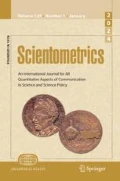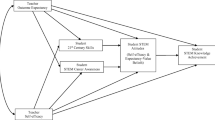Abstract
The noticeable tendency of young Croatian scientists towards a professional and foreign exodus can be explained not so much by their social, professional or material differentiation as by a subjective experience of their own life and professional situation; in other words, dissatisfaction of the researchers with their own professional and social status. The hierarchy of motives of a potential young scientists" drain indicates a complex pattern. It combines suppressive yet attractive motives where economic factors take precedence but with a desire for better conditions in scientific work and opportunities for promotion, thus demonstrating a motivational duality: integration into the general motivational migration pattern while displaying a scientifically motivational specificity.
Similar content being viewed by others
Notes and references
B. GOLUB, Croatian scientists' drain and its roots, International Migration 34 (1996) 609-625.
. A. H. Maslow, Motivacija i li Č nost (Motivation and the Personality) Nolit, Beograd, 1982.
E. Oteiza, A differential push-pull approach In: W. Adams (Ed.), The Brain Drain, MacMillan, New York/London 1968, pp. 120-134.
T. V. Busse, R. S. Mansfield, Selected personality traits and achievement in male scientists, The Journal of Psychology 116 (1984) 117-131.
J. M. Mahoney, Psychology of the scientists: an evaluative review, Social Studies of Science, 9 (1979) 349-375.
N. Toren, Attitudes towards work: A comparison of Soviet and American immigrant scientists in Israel, Social Studies of Science, 13 (1983) 229-253.
A. Goldberg, R. Kats, Migration and research commitments: Long-term effects of national socialisation, International Migration 22 (1984) 129-143.
The Brain Drain Report of the Working Group on Migration, Committee on Manpower Resources for Science and Technology, London, 1968.
G. R. Gonzales, The migration of Latin American high-level manpower, International Labour Review 98 (1968) 551-570.
D. L. Mckee, Some specifics on the brain drain from the Andean region, International Migration 21 (1983) 488-499.
D. L. Mckee, Argentina and the brain drain: Some perspectives from expatriates in the United States, International Migration 23 (1985) 453-459.
P. Visaria, Determinante odliva mozgova (Determinants of the brain drain), Teme o iseljeništvu, 7 (1977) 17-38.
T. K. Oommen, India: Brain drain or the migration of talent? International Migration, 27 (1989) 411-425.
M. S. Adiseshiah, Brain drain from the Arab world, Unesco Features Paris, 1970, pp. 7-11.
B. Thomas,'Modern' migration, In: W. Adams (Ed.), The Brain Drain, MacMillan, New York/London, 1968, pp. 29-49.
B. Golub, Potencijalni (profesionalni i vanjski) egzodus mladih znanstvenika (Potential (professional and external) exodus of young scientists), In: K. Prpić (Ed.), U potrazi za akterima znanstvenog i tehnološkog razvoja (In: Search of Actors of Scientific and Technological Development), Institut za drušstena istraž zivanja, Zagreb, 2000.
V. A. Markusova, Gilyarevskii, R. S., Chernyi, A. I., Griffith, B. C., Information behaviour of Russian scientists in the “Perestroika” period. Results of a questionnaire Study, Scientometrics 37 (1996) 361-380.
S. Eastwood, Derish, P. A., Leash, E., Ordway, S. B., Ethical issues in biomedical research: Perceptions and practices of postdoctoral research fellows responding to a survey, Science and Engineering Ethics 2 (1996) 89-114.
S. Hemlin, M. Gustafsson, Research production in the arts and humanities. A questionnaire study of factors influencing research performance, Scientometrics 37 (1996) 417-432.
S. Kyvik, Productivity differences, fields of learning and Lotka's Law, Scientometrics 15 (1989) 205-214.
W. O. Hagstrom, Competition in science, American Sociological Review 39 (1974) 1-18.
K. Prpi ć, Profesionalni i društveni poloåaj mladih istraåiva+a (Professional and social status of young researchers), In: K. Prpi ć (Ed.) U potrazi za akterima znanstvenog i tehnološkog razvoja (In: Search of Actors of Scientific and Technological Development) Institut za društvena istraåivanja, Zagreb 2000.
B. Golub, Vanjske migracije znanstvenika (Foreign Migration of Scientists). (Doctoral thesis). Filozofski fakultet Sveu+ilišta u Zagrebu, Zagreb, 1992.
Author information
Authors and Affiliations
Rights and permissions
About this article
Cite this article
Golub, B. Motivational factors in departure of young scientists from Croatian science. Scientometrics 53, 429–445 (2002). https://doi.org/10.1023/A:1014881231075
Issue Date:
DOI: https://doi.org/10.1023/A:1014881231075




